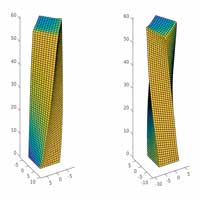 Researchers designed a polymer known as a liquid crystal elastomer that can be 'programmed' to both twist and bend in the presence of light. Especially in the field of soft robotics, this is essential for building devices that exhibit controllable, dynamic behavior without the need for complex electronic components.
Researchers designed a polymer known as a liquid crystal elastomer that can be 'programmed' to both twist and bend in the presence of light. Especially in the field of soft robotics, this is essential for building devices that exhibit controllable, dynamic behavior without the need for complex electronic components.
Tuesday, April 7, 2020
Engineers 'program' liquid crystalline elastomers to replicate complex twisting action simply with the use of light
 Researchers designed a polymer known as a liquid crystal elastomer that can be 'programmed' to both twist and bend in the presence of light. Especially in the field of soft robotics, this is essential for building devices that exhibit controllable, dynamic behavior without the need for complex electronic components.
Researchers designed a polymer known as a liquid crystal elastomer that can be 'programmed' to both twist and bend in the presence of light. Especially in the field of soft robotics, this is essential for building devices that exhibit controllable, dynamic behavior without the need for complex electronic components.
Personalized microrobots swim through biological barriers, deliver drugs to cells
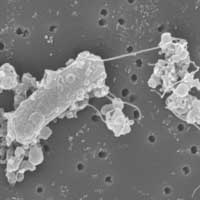 Biohybrid robots on the micrometer scale can swim through the body and deliver drugs to tumors or provide other cargo-carrying functions. The natural environmental sensing tendencies of bacteria mean they can navigate toward certain chemicals or be remotely controlled using magnetic or sound signals.
Biohybrid robots on the micrometer scale can swim through the body and deliver drugs to tumors or provide other cargo-carrying functions. The natural environmental sensing tendencies of bacteria mean they can navigate toward certain chemicals or be remotely controlled using magnetic or sound signals.
Protein implicated in dry eye and PTSD visualized at atomic level
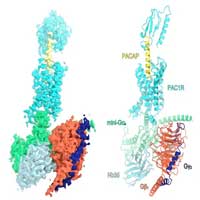 Researchers have captured an atomic-level high-definition image of a protein and the small molecule that binds to it. Both have been implicated in conditions including dry eye and post- traumatic stress disorder (PTSD). Full understanding of their structures will hopefully lead to development of an effective drug to regulate the protein's function.
Researchers have captured an atomic-level high-definition image of a protein and the small molecule that binds to it. Both have been implicated in conditions including dry eye and post- traumatic stress disorder (PTSD). Full understanding of their structures will hopefully lead to development of an effective drug to regulate the protein's function.
Physicists produce stable water-based graphene dispersion
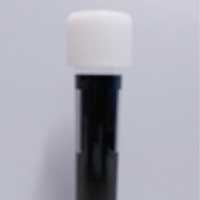 Researchers show how activated graphene, activated carbons and other hydrophobic carbons can be dispersed in water in a form of micrometer-sized particles. The key agent that helps to make these dispersions last for days is graphene oxide.
Researchers show how activated graphene, activated carbons and other hydrophobic carbons can be dispersed in water in a form of micrometer-sized particles. The key agent that helps to make these dispersions last for days is graphene oxide.
Atomic force microscopy reveals high heterogeneity in bacterial membrane vesicles
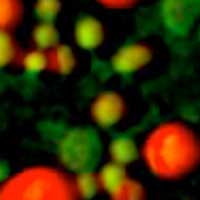 Scientists report that the physical properties of extracellular bacterial membrane vesicles are significantly diverse. The properties for a single type of bacterium as well as for different types are found to be highly heterogeneous.
Scientists report that the physical properties of extracellular bacterial membrane vesicles are significantly diverse. The properties for a single type of bacterium as well as for different types are found to be highly heterogeneous.
New method to monitor Alzheimer's proteins
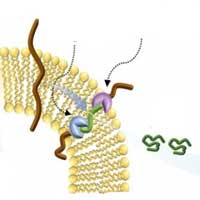 Terahertz waves detect the fibrillization state of amyloid beta proteins in solution.
Terahertz waves detect the fibrillization state of amyloid beta proteins in solution.
New nanophotonic saliva/nasal swab test to instantly detect coronavirus with lasers
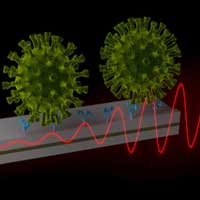 European photonics scientists are developing an ultrasensitive laser sensor that detects coronavirus at the earliest point of infection from a saliva or nasal swab in minutes.
European photonics scientists are developing an ultrasensitive laser sensor that detects coronavirus at the earliest point of infection from a saliva or nasal swab in minutes.
Using nanotechnology to develop new treatment for painful gynecological condition
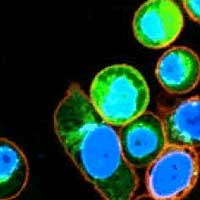 Scientists have developed a precise, nanotechnology-based treatment to alleviate the pain and fertility problems associated with endometriosis, a common gynecological condition in women of childbearing age.
Scientists have developed a precise, nanotechnology-based treatment to alleviate the pain and fertility problems associated with endometriosis, a common gynecological condition in women of childbearing age.
Subscribe to:
Comments (Atom)
